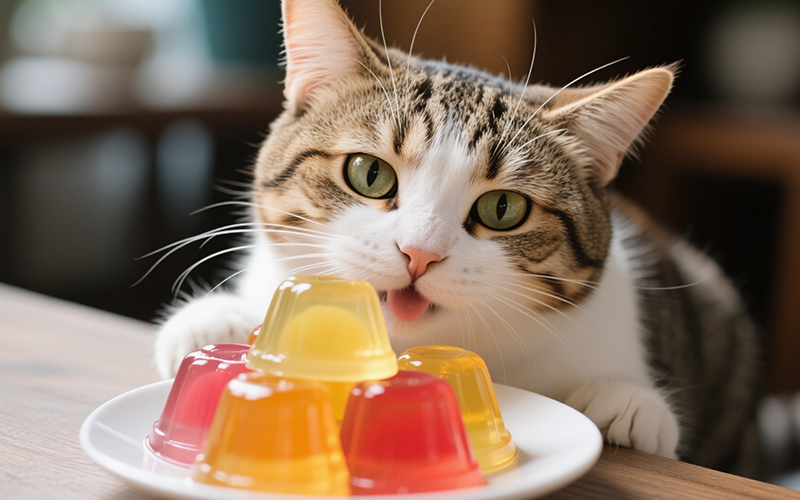Can Cats Eat Jello? Is This Sweet Treat Safe for Your Feline Friend?
- 7 Apr 2025 16:55
Jello is a popular and fun treat for humans, but when it comes to cats, can cats eat Jello? While it may seem harmless, Jello is not a good choice for your feline companion. Let’s explore why this sugary dessert is not suitable for cats and what alternatives might be better for their health.

Why Jello Is Not Safe for Cats
High Sugar Content: One of the biggest issues with Jello is its high sugar content. Cats don’t need sugar in their diet. In fact, cats are obligate carnivores, meaning their digestive systems are not designed to process sugars effectively. Consuming too much sugar can lead to obesity, diabetes, and other health problems in cats.
Artificial Sweeteners: Many Jello products contain artificial sweeteners, such as xylitol, which is extremely toxic to cats. Even small amounts of xylitol can cause a rapid drop in blood sugar, leading to symptoms like vomiting, lethargy, seizures, and even liver failure. Always check the ingredient list for harmful sweeteners before offering any human food to your cat.
Gelatin: Jello is made with gelatin, a substance derived from animal collagen. While gelatin is not harmful to cats in small amounts, it’s not a natural part of their diet. Some cats may have difficulty digesting gelatin or may find it difficult to chew. While it’s not toxic in small quantities, it's not beneficial to their health either.
Artificial Colors and Additives: Jello often contains artificial colors and flavors, which are not healthy for cats. These additives can sometimes cause allergic reactions or digestive upset in sensitive cats. Cats have very different dietary needs than humans, and many of the ingredients in Jello can cause issues with their digestion.
What Happens if Your Cat Eats Jello?
If your cat eats a small amount of Jello, they are unlikely to experience immediate severe effects. However, if they eat too much or if it contains harmful ingredients like xylitol, you may notice the following symptoms:
Vomiting: Jello can irritate your cat’s stomach, leading to nausea and vomiting.
Diarrhea: The sugar and artificial ingredients can upset your cat’s digestive system, causing diarrhea or loose stools.
Lethargy: If your cat consumes too much sugar or artificial sweeteners, they may become lethargic and weak.
Tremors or Seizures: If your cat accidentally eats Jello with xylitol, they may show signs of low blood sugar, such as tremors or seizures.
If you suspect that your cat has consumed Jello with xylitol or is showing any signs of distress, contact your vet immediately.
Safer Alternatives to Jello
If you want to give your cat a treat, there are many healthier and safer options:
Cat-Specific Treats: Choose treats made specifically for cats. These treats are designed to meet your cat’s dietary needs and are typically free of harmful ingredients like sugar and artificial sweeteners.
Cooked Chicken or Turkey: Lean, cooked chicken or turkey (without seasoning) can be a great, protein-packed treat for your cat.
Small Pieces of Fruit: Some cats enjoy small pieces of safe fruits like blueberries, melon, or banana (but only in moderation).
Cheese: If your cat isn’t lactose intolerant, a small piece of cheese can be a fun treat.
Catnip or Cat Grass: These are safe and natural treats that can engage your cat's senses and provide enjoyment.
The Role of PettureX in Pet Health
If you’re ever unsure about whether a particular food or treat is safe for your cat, PettureX is here to help! PettureX offers 24-hour online consultations for questions about your cat’s diet and health. You can also use its pet image recognition tool to check if certain foods are safe for your feline friend.
Conclusion
So, can cats eat Jello? The answer is no—Jello is not a safe or healthy treat for cats. It contains high sugar, artificial sweeteners, and other ingredients that are not suitable for your cat's digestive system. If you want to treat your cat, stick to healthier, cat-friendly options like cooked meats or specialized treats.
As always, when in doubt, reach out to PettureX for expert advice and support on your cat’s health and diet! 🐱💚
Related

Frankly Dangerous: Can Cats Eat Hot Dogs? Vet Explains the Serious Risks
- 16 Apr 2025
A Purrfect Protein? Can Cats Eat Ground Turkey Safely? (Vet-Reviewed Guide)
- 16 Apr 2025
Gritty Situation: Can Cats Eat Grits Safely? Vet Explains the Risks
- 16 Apr 2025
Gravy Danger Zone: Can Cats Eat Gravy Safely? (Vet-Reviewed Warning)
- 16 Apr 2025
Crunchy Query: Can Cats Eat Green Peppers? A Vet-Reviewed Safety Analysis
- 16 Apr 2025
Toxic Temptation: Can Cats Eat Grapefruit? Vet Explains the Dangers
- 16 Apr 2025
Emergency Meal or Major Mistake? Can Cats Eat Dog Food For A Couple Days? (Vet Guide)
- 16 Apr 2025
Dandelions & Felines: Can Cats Eat These Common Weeds Safely? Vet Explains
- 16 Apr 2025
Flaky Danger: Can Cats Eat Croissants Safely? Vet Explains the Buttery Risks
- 16 Apr 2025
Hazard Alert: Can Cats Eat Corn Husks? Vet Explains Dangers of This Fibrous Material
- 16 Apr 2025
